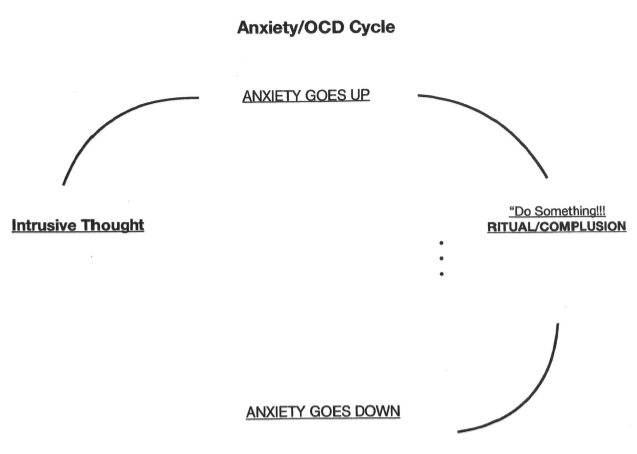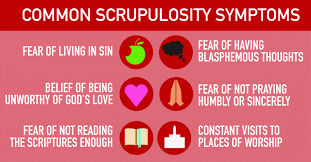
Scrupulosity The OCD Cycle We live in a society where we do not like to be uncomfortable and where we have difficulty tolerating distress. Anxiety is a word that has a lot of negative connotations, and because of this, we quickly try to find solutions and go into problem solving mode. For some people, the danger signal gets attached to everyday neutral things like people, social situations, doorknobs, dogs, physical sensations, or emotions. The actions we take when anxiety is present are called safety behaviors, or within OCD, they are called compulsions. These actions are meant to decrease our distress, which they do, but only temporarily. Some common safety behaviors are avoidance, reassurance seeking, researching, substance use, washing, counting, etc. Because these behaviors actually work, people keep using them, which causes individuals to get trapped in this cycle and never learn that the fear was unfounded or tolerable. Ironically, these safety behaviors and compulsions actually maintain the fear in the long run, simultaneously prevent growth and learning, and can severely limit an individual’s life. The thought, situation, emotion, or body sensation that creates the anxiety might be different within each presentation of OCD, but the cycle that maintains it is exactly the same. Please see our previous blog entry – Understanding the Cycle of Anxiety – for further information.
We live in a society where we do not like to be uncomfortable and where we have difficulty tolerating distress. Anxiety is a word that has a lot of negative connotations, and because of this, we quickly try to find solutions and go into problem solving mode. For some people, the danger signal gets attached to everyday neutral things like people, social situations, doorknobs, dogs, physical sensations, or emotions. The actions we take when anxiety is present are called safety behaviors, or within OCD, they are called compulsions. These actions are meant to decrease our distress, which they do, but only temporarily. Some common safety behaviors are avoidance, reassurance seeking, researching, substance use, washing, counting, etc. Because these behaviors actually work, people keep using them, which causes individuals to get trapped in this cycle and never learn that the fear was unfounded or tolerable. Ironically, these safety behaviors and compulsions actually maintain the fear in the long run, simultaneously prevent growth and learning, and can severely limit an individual’s life. The thought, situation, emotion, or body sensation that creates the anxiety might be different within each presentation of OCD, but the cycle that maintains it is exactly the same. Please see our previous blog entry – Understanding the Cycle of Anxiety – for further information.
What is Scrupulosity OCD?
Scrupulosity OCD is defined as obsessions and compulsions containing religious themes, hyper-morality, pathological doubt and worry about sins, and excessive religious behaviors. This type of OCD is not tied to any specific religious belief or background.
Common Obsessions with Scrupulosity

Obsessions may include any thought or mental image that the individual experiences as evidence of religious or moral failure including:
- repetitive thoughts about having committed a sin
- fear of offending their higher power with their actions or attitude
- fear of loss of salvation by sinning
- fear of having blasphemous thoughts
- fear of neglecting to follow the guidance of their higher power
- not feeling connected to their higher power
- unwanted sexual thoughts about religious figures
- unwanted mental images of Satan, 666, hell, etc.
- fear of loss of impulse control
- fear that they are going to harm their higher power or their personal connection to that power
These thoughts can create a high level of anxiety for the individual and make them feel a need to abide by excessive rules and rituals which then become compulsions.
Common Compulsions with Scrupulosity
Compulsions are defined as any intentional thought or behavior done in an effort to neutralize or reduce the distress caused by an individual’s anxiety, whether caused by thoughts, images or emotions. These can include:
- repetitive (excessive) prayers
- rereading text or prayers until it feels just right
- repeating religious rituals until it is just right
- repetitive (excessive) confession
- mentally reviewing one’s emotional state while engaging in an action
- engaging in acts of self-sacrifice
- asking religious authorities the same questions or similar question repetitively (reassurance)
- avoiding triggers like church, icons, reading religious texts, images, or other people’s faith
Individuals can feel very ashamed about these thoughts and behaviors and feel the need to hide these thoughts and behaviors from others, which can create additional barriers for connecting with their religious community and prevent them from the freedom or peace that they desire within their faith.
Treatment of Scrupulosity
The most evidence-based treatment for Scrupulosity OCD is Cognitive Behavior Therapy (CBT), Exposure and Response Prevention (ERP), and Acceptance and Commitment Therapy (ACT). The goal is for the individual to be able to practice their faith and related behaviors (reading, prayer, confession) in a healthy manner that is not bound by OCD’s rules. Treatment aims to help individuals to develop a healthy image and a genuine connection with their higher power, live their faith as is typical in their respective faith community, and avoid excessive reassurance seeking. Within CBT, individuals are able to recognize and differentiate their thoughts from their OCD’s thoughts and learn to interact with the world and their religion like the average person would. This can include working with your religious leader, challenging and restructuring thoughts, looking for evidence against their thoughts, and increasing flexibility with their thinking and behaviors.
Through ERP, individuals can engage in exposures to help them to learn to tolerate uncertainty, discomfort, and doubt that their OCD creates. Exposures can include reading their religious texts without rereading, holding unwanted images in their head, praying imperfectly, saying feared words, creating stories about their higher power being upset with them, etc. Please see our previous blog entry — What is Exposure and Response Prevention ERP – for more information about this treatment.
ACT, introduces individuals to the concepts of mindfulness and acceptance, thereby helping them to be present with their emotions and thoughts without trying to change them or engage in compulsions. Throughout treatment, individuals are better able to differentiate their thoughts and values from their OCD and identify if the behaviors they are engaging in provide them joy and pleasure (which is the goal), or if they are acting in response to anxiety and uncertainty from their OCD. Outside of therapy, some individuals with Scrupulosity OCD can also benefit from medication.
Need Help or Support?
If you or a loved one are struggling with OCD or any other mental health concerns, know that you are not alone. If you are a parent or a caregiver and are seeking additional information about these diagnoses and how you can best support your child, our office provides parent training with the SPACE program. Please see our November 2021 Newsletter for more information on SPACE. For these or any other mental health concerns, please contact The OCD and Anxiety Center at (630) 522-3124 or info@theocdandanxietycenter.com. We have offices located in Oak Brook and Orland Park. We provide telehealth services that are available in Illinois, Indiana, and Iowa. At The OCD and Anxiety Center, we can provide treatment both in the office and at off-site locations (your home, mall, school, etc.). We will work closely with you to create an individualized treatment plan and discuss the frequency of visits, having the ability to meet with you once a week or more if needed. We look forward to hearing from you!
Click here for more information on OCD Treatment.
Jacqueline Jones is a licensed clinical social worker at The OCD & Anxiety Center in Oak Brook, IL. She specializes in treating all forms of OCD and anxiety in children, teens, and adults. She provides Exposure and Response Prevention Therapy and is comfortable working in and outside the office, wherever anxiety happens.

